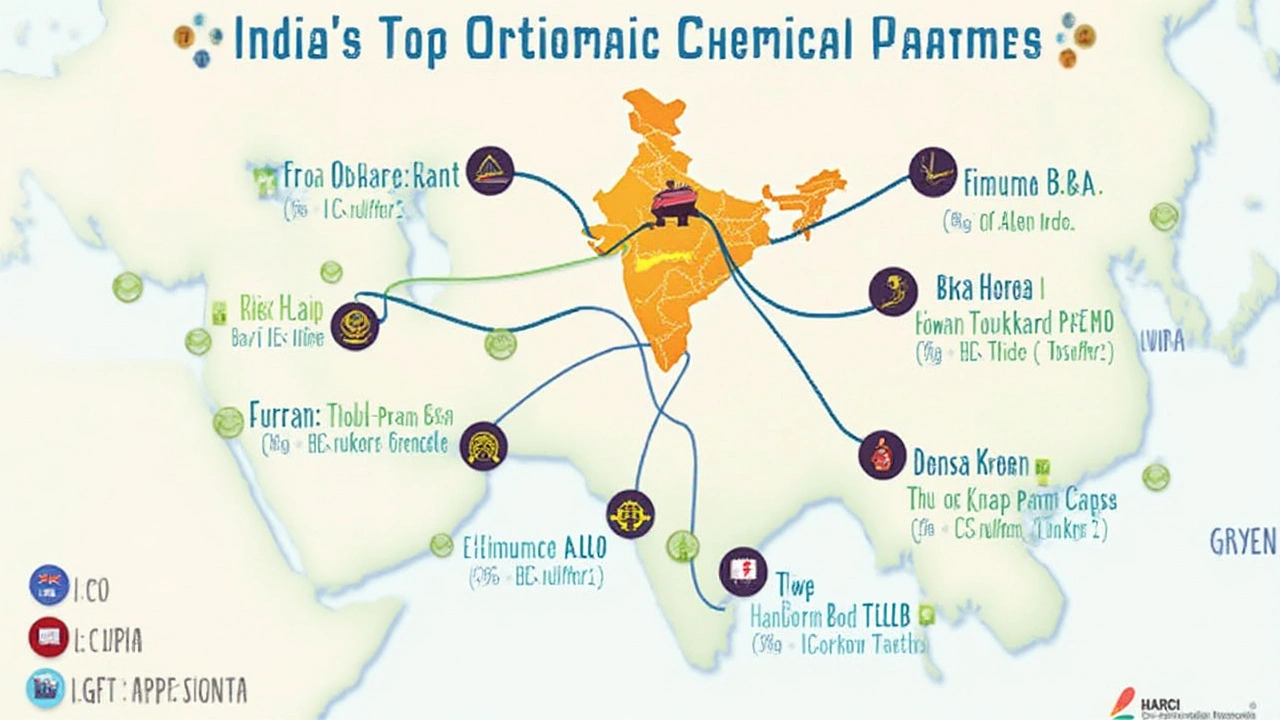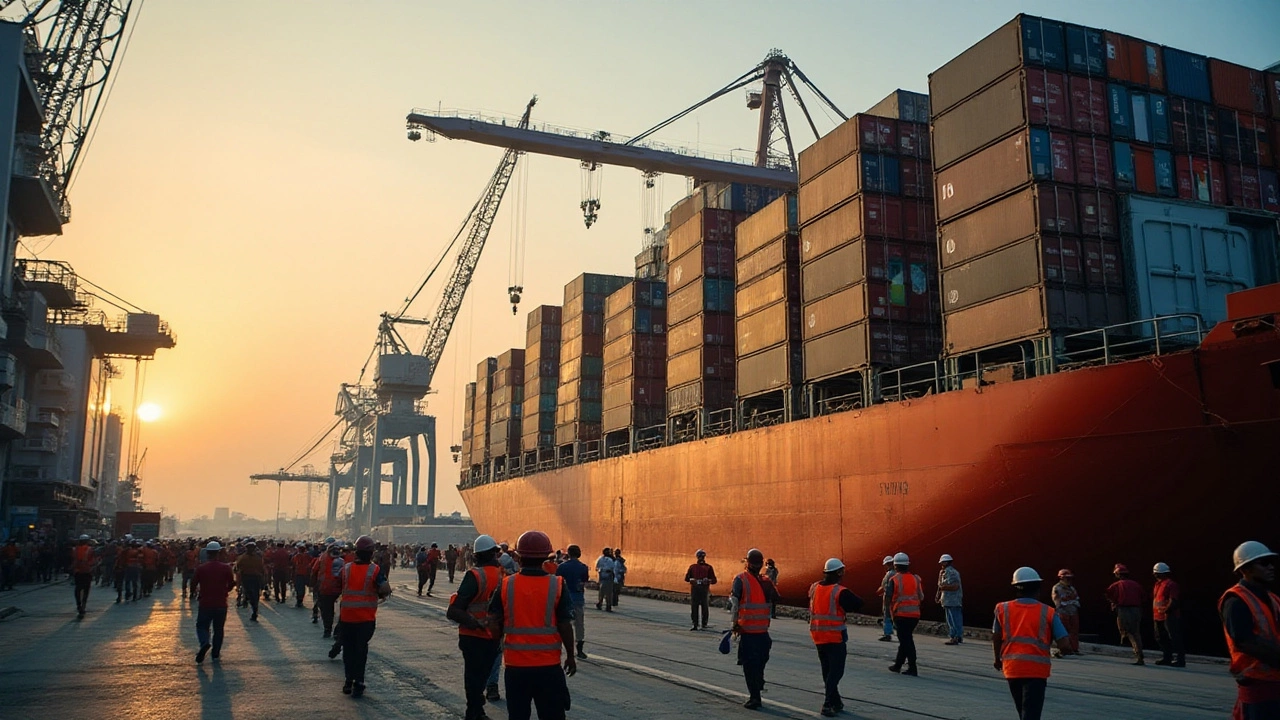In today's interconnected world, trade forms the backbone of economies across the globe. When it comes to India's import of organic chemicals, a few nations stand out due to their advanced production capabilities and strategic trade relationships. These chemicals play an integral role in various industries, from pharmaceuticals to agriculture, making it essential to understand the primary countries contributing to India's supply chain.
Exploring these key alliances not only provides insight into trade patterns but also highlights how global policies and economic conditions influence these imports. From understanding tariffs to recognizing emerging trends, grasping the breadth of India's organic chemical imports offers valuable perspectives for businesses, policymakers, and curious minds alike.
- Introduction to Organic Chemicals Trade
- Major Exporters to India
- Trade Agreements and Tariffs
- Impact of Global Economic Policies
- Future Trends in Chemical Imports
Introduction to Organic Chemicals Trade
Trade in organic chemicals stands as a fundamental pillar in the global commerce landscape. Organic chemicals, primarily carbon-based compounds that exclude inorganic substances, play a crucial role in multiple industries. These industries range from pharmaceuticals and agrochemicals to textiles and dyes, making them indispensable in advancing economies like India. The demand for such compounds is largely driven by rapid industrialization, particularly in emerging economies where there is a significant push towards manufacturing and chemical innovation. As such, the trade of organic chemicals is not just a statistic but a vibrant reflection of technological advancement and economic prowess.
Emerging economies, including India, import considerably from industrially developed nations that have an edge in chemical manufacturing. Countries like China, Germany, and the United States are often at the forefront, thanks to their vast research and development capabilities which they leverage to produce these critical compounds efficiently. Due to their well-oiled production processes and established supply chains, these nations maintain a pivotal presence in the global supply of organic chemicals. Notably, Germany, with its long history in chemical engineering, exports a substantial volume of these compounds, making it a critical player in India's import strategy.
The complexities of trade agreements and regulatory frameworks between countries add layers to these exchanges. It's fascinating to observe how economic ties and political relationships between nations influence the flow of these resources. For example, trade policies that include tariff reductions or preferential trade agreements can significantly alter the dynamics of imports. A notable instance is the impact of US trade policies on global exports; a shift in Washington’s stance can ripple across various global markets. The accessibility of organic chemicals often fluctuates with these political winds, making it imperative for nations like India to navigate these waters astutely.
"The global trade of chemicals, including organic variants, underscores the interconnected nature of modern economies," notes Dr. Howard Lim, a trade analyst with extensive expertise in chemical markets. He emphasizes that understanding this trade is key to making informed decisions in trade policy and economic development.
For any nation looking to enhance its manufacturing sector, securing a steady and reliable supply of organic chemicals is critical. India, with its burgeoning pharmaceutical and agricultural sectors, is no exception. Ensuring availability not only supports national industries but also positions the country as a significant player in global manufacturing. In light of this, India's government, in collaboration with its private sector, continually seeks to strengthen its import channels and diversify its sources to ensure adequate supply regardless of international fluctuations.
As we delve deeper into the intricacies of this trade, it becomes apparent that understanding the nuances of organic chemical imports goes beyond supply chain logistics. It involves geopolitical strategies and the balancing of relationships, economic dependencies, and technological dependencies. This foundational overview sets the stage for exploring the key countries that export these essential chemicals to India, each contributing uniquely to this critical trade network.
Major Exporters to India
In the bustling world of international trade, India stands as a significant player, importing a wide array of goods, including organic chemicals. The demand for these chemicals has seen a steady rise due to India's thriving industries such as pharmaceuticals, textiles, and agriculture. Among the top exporter nations, China takes the lead, leveraging its extensive industrial infrastructure and cost-effective production capacities. China's stronghold in the organic chemical sector can be attributed to its vast resources and emphasis on technological advancements, making it a primary exporter to India.
Another notable country is Saudi Arabia, which has successfully carved out a niche in the organic chemical market. This comes as no surprise given its petrochemical prowess and strategic focus on economic diversification through Vision 2030. The bilateral ties between India and Saudi Arabia have been fostered through mutual agreements, promoting smoother trade relations. Germany, too, finds its spot among India's import partners owing to its high-quality and innovative chemical products. Known for stringent quality standards and innovative research, German manufacturers offer a varied range of specialized chemicals catering to India's diverse industrial requirements.
The United States cannot be overlooked when discussing organic chemical imports. With a robust regulatory framework and advanced R&D facilities, American chemical manufacturers provide high-grade organic chemicals that are quintessential for India's domestic industries. The US-India trade relations continue to strengthen through dialogues and policy adjustments, encouraging a flow of high-value goods across borders. Japan also plays a pivotal role as an exporter, emphasizing sustainable and environment-friendly chemical production processes. The ethical manufacturing practices and safety standards followed by Japanese firms attract Indian businesses focused on sustainable development.
Analyzing the trade balance, it's evident that these major exporters have not only fulfilled a vital domestic need but have also influenced global commerce trends. A report by the International Trade Centre delineates the top economies involved, showing that over 70% of organic chemicals in India are imported from these nations, highlighting their crucial role in shaping India's industrial landscape. These strategic alliances are reflected not just in economic statistics but also in the numerous collaborative efforts between companies across borders.
Let's not forget the regulatory and environmental implications that come into play when discussing such trade. Each of these exporting countries has distinct policies and standards affecting their production and export capabilities, which in turn impact Indian industries. The synergies created help in tackling both environmental concerns and economic challenges, as noted in various global trade discussions. To sum it up, the dynamics of India's organic chemical imports are pivotal in understanding global trade patterns, bringing into focus the critical partnership India shares with these countries.

Trade Agreements and Tariffs
When it comes to importing organic chemicals, India has skillfully woven a complex web of trade agreements and tariffs with numerous countries worldwide. These agreements are instrumental in deciding the flow of goods, impacting both economy and industry standards. Historically, India has negotiated with nations such as the United States, Germany, and China, forming essential trade links that ensure a smooth exchange of commodities. Tariffs, on the other hand, are a double-edged sword. While they are intended to protect domestic industries, they may sometimes hinder the influx of crucial materials, making it necessary for policymakers to find a delicate balance.
For instance, under the India-Japan Comprehensive Economic Partnership Agreement (CEPA), tariffs on many chemical products have been substantially reduced or even eliminated, propelling an upward trend in bilateral trade. This move has significantly benefitted chemical manufacturers in both nations, fostering an environment of mutual growth and collaboration. Such agreements often involve meticulous negotiations inclusive of rules of origin and environmental considerations to ensure that the trade benefits both parties without harming domestic ecosystems or indigenous industries.
The Influence of Global Economic Policies
Global economic policies also play a crucial role in shaping India's organic chemicals imports. International economic organizations like the World Trade Organization (WTO) often mediate and regulate trade disputes that may arise from tariff disagreements or sanctions. In recent years, the shift towards more sustainable practices globally has led India to seek agreements that prioritize not only financial benefits but also environmental sustainability. This shift is crucial, as India aims to become a significant player in the green chemistry sector, aligning with global expectations and trends.
Statistics reveal that imports of organic chemicals constitute a large segment of India's overall import portfolio. A table showcasing the recent import data can be instrumental in understanding the trend:
| Country | Import Percentage |
|---|---|
| United States | 20% |
| Germany | 15% |
| China | 30% |
Through these international trade dynamics, India continually redefines its position in the global market, learning to embrace both the challenges and opportunities that emerge. Negotiating favorable terms while keeping tariff barriers at a strategic level is a key aspect of achieving competitive advantage in the ever-evolving landscape of chemical trade. Visionary leadership equipped with diplomatic negotiation skills is essential to ensure that these agreements benefit India well into the future.
Impact of Global Economic Policies
Global economic policies can significantly alter the landscape of India's import of organic chemicals. These policies influence trade tariffs, bilateral agreements, and even global supply chains. Let's take the recent trade agreements between India and the European Union as an example. Such agreements can lead to reduced tariffs for certain chemicals, making them more economically feasible for import. The EU, known for its high standards in chemical production, could become a more prominent supplier to India under these improved conditions. These policies encourage a smoother exchange, fostering greater cooperation between nations.
The changing dynamics of import taxes and trade routes, driven by policies, play a crucial role in determining import costs. For instance, if a country like Germany offers a robust trade policy with decreased tariffs on organic chemicals, it could potentially rise as a leading exporter to India. On the flip side, policy changes in China, one of the biggest exporters of organic chemicals, such as increased tariffs or regulatory shifts, could hinder its competitiveness in the Indian market. These policy shifts are not merely economic maneuvers but strategic decisions that ripple across the globe, influencing production, cost, and export decisions many nations away.
Another essential aspect is regulatory compliance, which forms the bedrock of international trade. Countries adhere to varied public health and environmental safety standards when trading chemicals. As global policies evolve, they often aim to harmonize these standards, easing cross-border trade tensions. According to the World Trade Organization, a harmonized policy environment could potentially boost global exports by up to 20%.
The World Economic Forum notes, "In today's global market, policy frameworks can either open doors or build walls between trading partners."Such regulations ensure that while India continues to import, it maintains high safety and quality standards, ultimately protecting the end-users and the environment.
The geopolitical climate also plays a pivotal role, as international relations can lead to either a shift or a continuity in policies affecting trade. Sanctions, for instance, can act as a double-edged sword; while they might control trade with a particular country, they can simultaneously open doors for others. Recently, changes in the United States' stance on global sanctions have significantly impacted trade flows, indirectly influencing where countries, including India, source their organic chemicals. With this complex web of policies and their ripple effects, India's chemical manufacturers need to remain agile in navigating the ever-shifting global economic landscape.
Rising global concerns like climate change also affect policy-making, which in turn impacts trade. Countries are now more inclined to support sustainable and environmentally-friendly trade practices. This has prompted industries, including chemical manufacturers, to shift towards greener alternatives, aligning with global commitments like the Paris Agreement. As these policies tighten around environmental regulations, India might witness a paradigm shift in its list of import partners, leaning towards those nations that not only offer competitive pricing but also adhere to sustainable practices. This global drive towards sustainability could redefine traditional trading patterns, pushing both exporters and importers to innovate and adapt.

Future Trends in Chemical Imports
As we edge closer to the latter half of the decade, the landscape for the importation of organic chemicals into India is set to undergo significant transformation. A growing synergy between digital innovation and chemical trading processes is reshaping how these imports are managed. Automation and advanced data analytics are becoming integral, allowing importers to better predict demand patterns and source chemicals more efficiently. Additionally, sustainability concerns are leading firms to seek greener alternatives, resulting in a more eco-conscious approach to importing practices. This shift is not only driving innovation but is also fostering stronger bilateral relations with countries excelling in environmentally friendly production methods.
The influence of geopolitical factors cannot be overlooked either. With changes in trade policies and international relations, India is navigating through complex networks of alliances. This prompts a realignment in import strategies, often poised towards diversification of sourcing nations. The strategic pivot away from over-dependence on a handful of suppliers is becoming common practice, aimed at mitigating risks associated with international supply chain disruptions. This dynamic shift could see a rise in Indian demand for organic chemicals from regions that offer stable political environments and competitive manufacturing capabilities. Such recalibration is quintessential for bolstering India's economic resilience in the face of global market fluctuations.
Emerging technologies are also front and center in this evolution. The rise of blockchain technology, for instance, is revolutionizing transparency and traceability in the import supply chains. By ensuring each transaction is secure and verifiable, importers are reducing the risks associated with fraud and enhancing confidence among trading partners. This technological revolution, coupled with an increasing focus on interoperability, is streamlining operations and cutting down costs — benefits that could be passed down the chain, affecting pricing and availability of organic chemicals to end-users in India.
Considering the impact of external shocks, such as the COVID-19 pandemic or global economic slowdowns, the importance of flexible and adaptive import strategies has never been more apparent. Building robust infrastructure to support seamless transitions and swift responses to market demands is crucial. The commitment to fostering innovation, sustainability, and strategic partnerships hint at a vibrant future for India's organic chemicals import sector. According to a report by the World Trade Organization, "Adapting to the rapidly changing global trade environment is no longer optional; it is essential for growth." This perspective underscores the necessity for ongoing developments and adjustments in how India engages with the global market.
